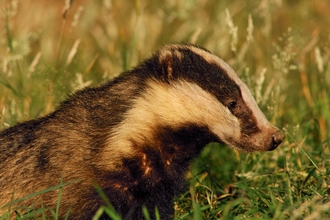The Wildlife Trusts have opposed the badger cull since it first started and no Wildlife Trust will allow badger culling on its land.
What is bovine tuberculosis?
Bovine tuberculosis (bTB) is a highly infectious disease of cattle which devastates thousands of farming businesses annually. Since the mid-1980s, the incidence of bovine tuberculosis in cattle has increased substantially creating an economic burden on the taxpayer and the farming industry, as infected cattle must be culled.
UK Government research shows that tuberculosis is not a major cause of death in badgers. Generally, infected badgers do not show any sign of infection and can survive for many years before suffering from severe emaciation.
What do The Wildlife Trusts believe?
We are very conscious of the hardship that bovine tuberculosis (bTB) causes in the farming community and the need to find the right mechanisms to control the disease. However, we believe that a badger cull is not the answer. The scientific evidence demonstrates that culling is likely to be ineffective in fighting the disease and, worse still, risks making the problem even worse. We believe the emphasis of all our efforts should be to find a long-term solution and we call for the UK Government to implement its manifesto commitment to end the culling of badgers.
This is a cattle problem, not a badger problem
Evidence shows that badgers are not the primary cause of the spread of tuberculosis in cattle and that the primary route of infection is from cow-to-cow contact – so a vaccine for cattle should be a government priority.
Since 2011, Wildlife Trusts have been involved in vaccinating badgers on our nature reserves and in the wider countryside in partnership with vets, farmers and landowners.
The cull is scientifically unsound
Robust evidence is still lacking to demonstrate that badger culling is worth the loss of thousands of badgers and millions of pounds of public spending. To justify the badger cull and to try and show that badger culling is having a significant impact on lowering bovine TB in cattle, the previous UK Government regularly used the Downs et al (2019) paper and more recently, the Birch et al (2024) paper. Both papers however noted that they didn't or couldn't take acccount of confounding factors. The latter paper described one of these confounding factors, noting that the study farms involved in the Badger Control Policy were required to implement reasonable biosecurity measures. It went on to conclude that whilst it found a reduction in bovine TB on the study farms, the "vaccination of badgers, fertility control and on farm biosecurity may also achieve this effect".
Badgers are a valued species in the UK, protected by law. 25% of the European population is found in the UK, so we have an international responsibility to conserve them.
What are The Wildlife Trusts doing?
The Wildlife Trusts have been working on the issue of bovine tuberculosis and its links to badgers for several years. During this time our activities have included:
- Undertaking badger vaccination programmes since 2011* on our nature reserves and in the wider countryside in partnership with vets, farmers, and landowners.
- Standing up for badgers in local and national media
- Loobying the previous UK Government to drop this failed badger cull policy, implement an all-encompassing badger vaccine strategy and encouraging the advancement of the cattle vaccine
- Collating, summarising and presenting the science on the spread of bovine tuberculosis
- Encouraging our members and supporters to write to their MPs to press for a different approach to eradicating bovine tuberculosis, without culling badgers.
- Working with Defra on a Badger Edge Vaccination Scheme
- Supporting and promoting e-petitions to stop the cull
Read more about what The Wildlife Trusts believe to be the solution to tackling bovine tuberculosis, as well as recent blogs and press releases on the issue below:

The Wildlife Trusts respond to UK Government's inadequate consultation on badgers and bovine tuberculosis
Jo Smith, Chief Executive of Derbyshire Wildlife Trust, shares The Wildlife Trusts' thoughts on the wholly inadequate 5-week…

Government culls badgers in 11 new areas this autumn
Badger culling to be permitted in a total of 69 places. The 2022 cull season could see up to 68,000 badgers killed.

The Wildlife Trusts respond to new badger cull licences
The Wildlife Trusts are disappointed and saddened that the Government has issued new licenses to cull badgers in seven areas of England…
Donate to badgers today

Badger © Andrew Parkinson/2020VISION
Join your local Wildlife Trust today
By becoming a member of your Wildlife Trust you will be helping to look after the wildlife and wild places in your area.







